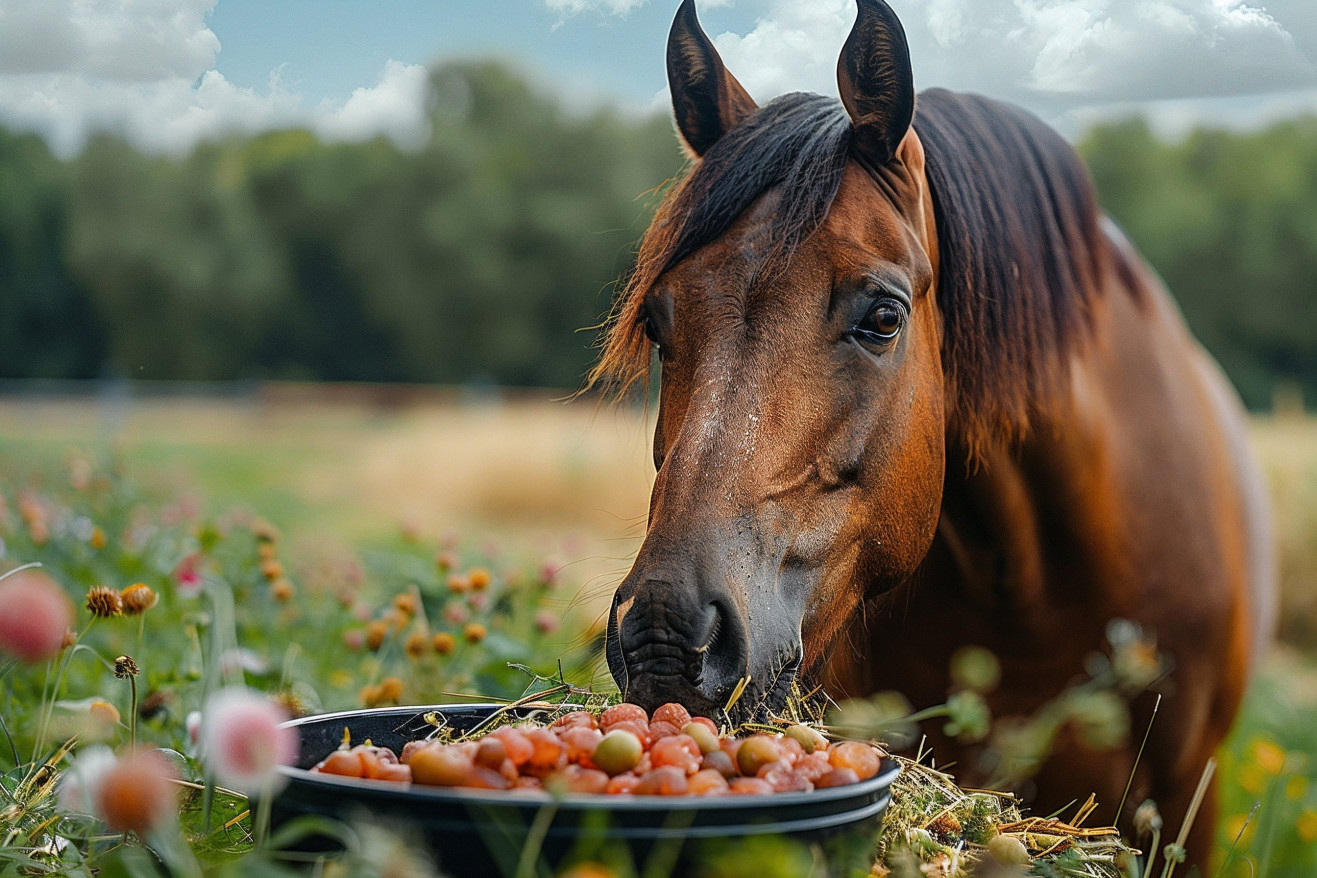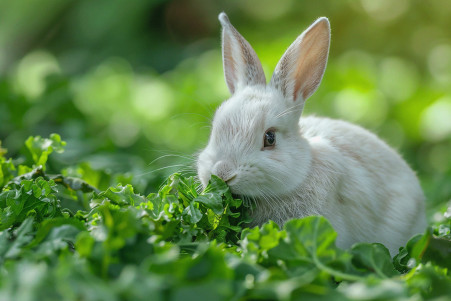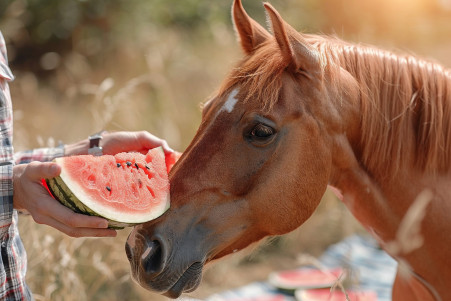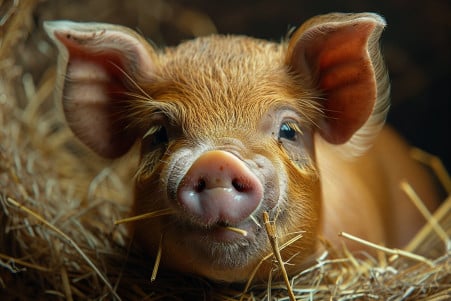Do Horses Eat Meat? Equine Dietary Needs Explained
13 March 2024 • Updated 12 March 2024

When you think of horses, you probably think of fields and grass, but that might lead you to wonder: do horses eat meat? While there have been a few historical reports of horses eating meat, horses are herbivores. Their digestive systems are not designed to process meat and doing so can cause a number of health problems. As a result, horses should be fed a diet that is primarily—if not entirely—plant-based.
This article will take a deep dive into the world of equine nutrition, using information from animal behavior and equine nutrition research as well as historical evidence to explain why horses are herbivores. We’ll cover the details of the horse’s digestive system and why it’s set up to process a diet that is high in plant material.
We’ll also cover the few cases of horses eating meat to give you a complete picture of this rare behavior.
Can horses eat meat?
Horses Are Herbivores
Whether they are grazing in a field of grass or eating the hay and grains that are fed to them in stables, the horse’s diet is based on their classification as an herbivore.
Horses are natural grazers, and their diet is based on a variety of plant-based foods that provide the nutrients they need to survive.
Grasses, hay, and grains like oats, corn, and barley are all part of a horse’s diet, and they provide the fiber, vitamins, and minerals that horses need to thrive. Strathorn Farm Stables explains that fiber is especially important because it helps maintain the balance that is needed for a horse’s digestive system to function properly.
The horse’s digestive system is an evolutionary wonder that is perfectly designed to ferment fibrous plant material.
Horses don’t have the enzymes and digestive structures that carnivores do, including a gallbladder that is designed to digest fat and a stomach that is designed to digest protein.
An article by National Equine explains that a horse’s flat teeth and long digestive system are signs that horses are meant to process plant material, not animal protein. Research from the Equine Institute explains that feeding horses meat can lead to health issues and disrupt the symbiotic microbial balance in their gut.
Knowing these physiological facts about horses makes it clear that a plant-based diet is not only natural for horses but also necessary for their survival. Research from the Equine Institute also explains that it’s important to keep horses on a plant-based diet to prevent health problems since their bodies aren’t equipped to process meat.
The Science of Horse Nutrition
The horse’s diet is a complex balance of nutrients that must work together in order to keep the animal healthy. According to the Merck Veterinary Manual, horses need a diet that is high in forages, such as grasses and legumes, that can be fermented in the cecum and large colon to produce energy.
This is supported by the action of enzymes in the small intestine that help break down carbohydrates, proteins, and fats and aid in the absorption of nutrients.
In terms of the biological requirements of horses, the National Research Council explains that the energy requirements of horses depend on their activity and physiological state, while the protein and amino acid requirements of horses are especially important for growing, working, and lactating horses.
Meanwhile, a nutritional management guide from Purdue University Extension recommends that horses eat at least 1.5–2% of their body weight in forages each day and warns that limited water intake can lead to colic and other metabolic issues.
While the introduction of meat as a non-traditional food source may disrupt the nutritional balance of horses and potentially lead to health problems because their digestive systems aren’t well-equipped to handle the high levels of protein and fat, a deeper look at the anatomy and function of the horse’s digestive system suggests that it’s important to maintain a diet that’s in line with their natural herbivorous diet in order to keep them healthy.
How the Horse Digestive System Works
The horse digestive system is a marvel of evolution, a highly specialized system that has evolved to process a high-fiber, herbivorous diet. From the mouth, where horses use their flat, broad teeth to grind plant material, to the stomach, which is relatively small and limits the amount of food a horse can consume at one time, the horse digestive system is a wonder of complexity.
According to the Equine Science Center, the stomach, which contains enzymes and hydrochloric acid, is where digestion begins, but it’s the hindgut that’s responsible for the real work of fiber fermentation. In the cecum and large colon, microbial digestion breaks down fibrous material and allows for water reabsorption, which is critical for maintaining proper hydration and nutrient absorption.
That said, the horse digestive system is not designed to handle high-fat or high-starch diets, and it’s definitely not designed to handle meat. Horses lack a gall bladder, which means they can’t process the fats in meat, and a diet that includes meat can disrupt the balance of the horse’s gut microbiome.
Meanwhile, a diet that’s high in starch can lead to fermentation in the wrong part of the digestive system, which can lead to problems like colic and laminitis.
To keep horses healthy, Rutgers Cooperative Extension recommends that horses be fed a diet that prioritizes forage, with concentrates being fed in moderation, and that horses have access to fresh water and salt at all times.
When we feed horses in a way that respects the limitations and the capabilities of their digestive systems, we’re respecting the horse’s health and setting them up for success, which is a genuine reflection of the balance of nature.
Historical Examples of Horses Eating Meat
Although horses are generally herbivores, historical examples show that horses have been able to adapt to eating meat.
In the book Deadly Equines by CuChullaine O’Reilly, published by The Long Riders’ Guild Press, O’Reilly challenges the idea that horses are strict herbivores by providing examples of horses eating meat throughout history, from eating different proteins to rare but well-documented instances of aggression and carnivory.
This is backed up by an article from The Horseaholic that explains how Siberian horses were trained to eat meat and animal fat to survive the harsh conditions of an arctic expedition when there was no grass to eat.
In addition, examples like Sir Ernest Shackleton’s Manchurian pony, Socks, eating a meat-based meal with his owner and a German expedition’s filmmakers observing Tibetan horses drinking blood show how horses have adapted to their environments.
While these examples are not typical of horse behavior, they show how horses can adapt to extreme circumstances when they have to. Given the evolutionary history of these animals, it’s clear that while horses can adapt, their ability to eat meat is an exception rather than a rule.
Horses’ Long History of Herbivory
The modern horse species is the result of millions of years of evolution, and their history is closely tied to their herbivorous diet. Anatomical features like high-crowned molars are one example of how horses have evolved to eat plants.
A paper from PubMed written by Matthew C. Mihlbachler explains that high-crowned molars are an adaptation to abrasive diets that arose with the expansion of grasslands, showing how the structure of teeth has evolved to meet dietary needs.
The American Museum of Natural History’s description of the history of the horse demonstrates how the evolution of horses has been shaped by their move toward an herbivorous diet. It explains that as horses’ ancestors moved from living in forests to living in grasslands, they had to develop specialized digestive and dental adaptations, including high-crowned molars that could grind down tough grasses.
Meanwhile, The Animal Synergist wrote about a study by Sarah Griffiths and Dr. DCH, which points out that the evolution of the horse’s diet was driven by the development of hindgut fermentation.
This led to the enlargement of the cecum and the hindgut chamber, which could break down a fibrous diet and house symbiotic bacteria. This evolution made it clear that horses were animals of the grasslands, with their behavior and physical features adapted to a diet that was far from carnivorous.
As a result of these physiological and behavioral adaptations, a meat-based diet would not only go against the horse’s evolutionary history but also put their health in danger, confirming that they are indeed strict herbivores.
A Natural Diet: The Foundation of Horse Nutrition
Throughout our investigation into the horse’s natural diet and the nutritional implications of feeding horses meat, we have delved into the biological, historical, and evolutionary reasons that define the horse as an herbivore.
The evidence presented in this investigation shows that horses are biologically and evolutionarily adapted to thrive on a plant-based diet. Their highly specialized digestive system, including a hindgut that has evolved to ferment fibrous plant material, is not equipped to digest meat, a conclusion that is supported by a wealth of evidence and the consensus of the scientific and zoological communities.
While there are historical examples of horses eating meat, these are rare occurrences that happen under extreme circumstances and are primarily about survival rather than a horse’s natural dietary inclinations. As a result, they do not change the basic herbivorous nature of the horse.
In summary, it is important to recognize the importance of feeding horses in a way that is consistent with their natural dietary needs in order to promote their health and well-being. This information is intended to help horse owners and others responsible for feeding horses make dietary choices that meet the natural needs of these amazing animals and, in doing so, help ensure their health and beauty for generations to come.


